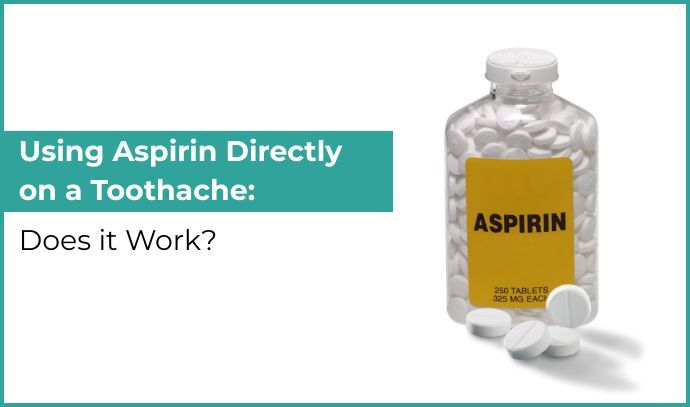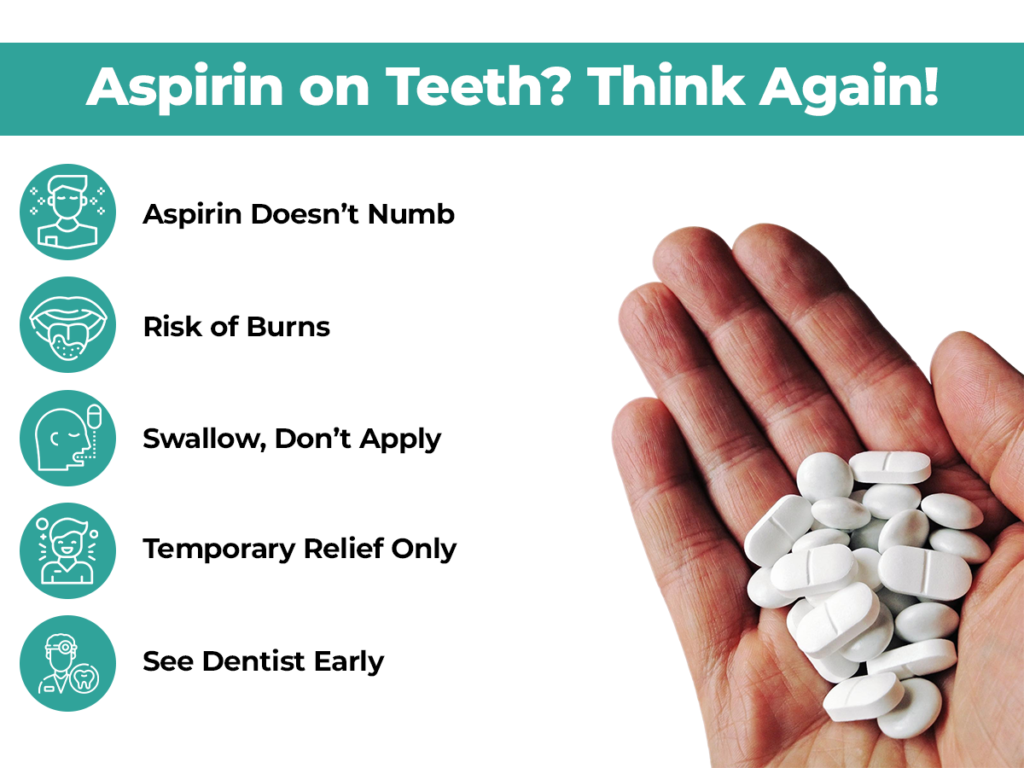
Using Aspirin Directly on a Toothache: Does it Work?
Tooth pain can stop you in your tracks, whether it’s while eating, talking or even trying to sleep. Out of desperation, many people place aspirin directly on the aching tooth, hoping for fast relief. The reality, however, is that aspirin for toothache works only when swallowed, not when applied topically. In fact, putting it directly on your tooth or gums can do more harm than good.
This article clears the confusion, explains safe ways to ease pain and shows when it’s time to call your dentist for lasting relief.
Why Do People Use Aspirin for Toothache Relief?
It’s easy to understand why people experiment with this remedy. Aspirin is available in almost every household and when toothache strikes suddenly, it feels like a quick solution. The assumption is simple: if aspirin relieves pain when taken orally, it should work faster when placed directly on the tooth.
Unfortunately, that assumption is misleading. Aspirin is not a numbing agent. Applying it directly only risks burning your gums and worsening your discomfort instead of chasing a quick fix that backfires knowing the right way to use it saves you from unnecessary pain.
Does Placing Aspirin on the Tooth Actually Work?
The direct answer: no, it doesn’t. Aspirin only provides relief when absorbed into your bloodstream. Also, placing it on your tooth or gum does not numb pain and often leaves behind burns on delicate oral tissues.
Think of it this way: rubbing aspirin on your head for a headache won’t ease the pain, your mouth works the same way. Instead of helping, this “home trick” often leaves people with painful ulcers and swollen gums. If your pain feels unbearable along with swallowing the correct dose and calling your dentist is far safer than experimenting with harmful shortcuts.

How Aspirin Works When Taken Correctly?
When used properly, aspirin can provide temporary relief from toothache:
- It blocks pain signals to the brain.
- It reduces swelling around irritated nerves and gums.
- It manages fever if the pain is linked to infection.
But here’s the catch: these effects only happen when the tablet is swallowed with water. The disappointment many feel after trying to place it directly on a tooth is simply because aspirin wasn’t made to work that way. If the pain persists even after proper dosage that’s your body’s way of telling you it’s time for a dental check-up.
Risks of Using Aspirin Directly on a Toothache
Before you reach for this “hack,” consider the risks:
- Chemical burns on gums, tongue or inner cheeks.
- Painful ulcers that can last days.
- False sense of relief which delays treatment.
- Worsening infection if the root cause is ignored.
Every time you try to silence tooth pain without addressing the source you risk turning a small problem into a major dental emergency. A simple cavity left untreated can quickly escalate into severe nerve infection and will cost you more time along with money and discomfort.
How to Use Aspirin for Toothache Safely?
If you’re considering aspirin for toothache, here’s the correct way:
- Step 1: Confirm dosage instructions on the packaging.
- Step 2: Swallow the pill with water and never press it against the tooth.
- Step 3: Combine it with supportive relief like a cold compress.
- Step 4: Contact your dentist to treat the actual cause.
Trying to bypass these steps by applying aspirin directly is like pouring medicine on your skin for stomach pain; it simply doesn’t work.
When Toothache Pain Signals Something Serious?
Not all toothaches are equal. Some are warning signs of conditions that need urgent care. You should seek immediate dental help if you notice:
- Constant throbbing that painkillers can’t control.
- Swelling in the jaw, cheeks or gums.
- Fever, headache or general weakness along with pain.
- Pus or discharge around the tooth.
- Difficulty chewing, opening your mouth or swallowing.
These symptoms usually point to infections that aspirin won’t cure. The longer you wait the higher the risk of spreading infection to surrounding tissues.
Why is Professional Care the Only Long-Term Solution?
Painkillers can dull discomfort but they can’t stop decay even reverse gum infection or repair nerve damage. The longer toothache is ignored the greater the risk of tooth loss or severe infection. What starts as mild sensitivity may soon leave you unable to chew or sleep peacefully.
Visiting a dental clinic in Kochi or a dental clinic in Calicut ensures the real problem is diagnosed and treated early. That way you walk out not just pain-free but also confident that your dental health is protected for the future.
Why Choose Elite Dental Studio for Toothache Relief?
At Elite Dental Studio the goal is never just to numb pain temporarily but to restore lasting comfort, confidence and long-term oral health. Whether it’s filling root canal therapy or preventive care every treatment is guided by advanced diagnostics and a gentle approach that helps patients feel at ease. That’s why countless people who once struggled with persistent toothaches have walked out not only pain-free but also reassured with healthier and brighter smiles with a trust that truly sets the clinic apart.
After all, quick hacks like pressing aspirin against a tooth might seem tempting at the moment but they often leave behind burns, ulcers and disappointment. Real relief doesn’t come from shortcuts, it comes from addressing the root cause with the right care. If tooth pain has been holding you back then now is the time to break free. Book your consultation with Elite Dental Studio today and take the first step towards lasting relief along with the comfort and a confident pain-free smile.
Frequently Asked Questions
Can aspirin cure a toothache permanently?
Ans. No, aspirin cannot cure a toothache. It only helps manage pain temporarily when swallowed but it does not treat the underlying cause such as cavities, infections or gum disease. Permanent relief comes only after a dentist diagnoses and treats the root problem.
Is it safe to put crushed aspirin on my gums for quick pain relief?
Ans. No, applying crushed aspirin directly on your tooth or gums can cause chemical burns, painful ulcers and irritation. The safe way to use aspirin for toothache is to swallow the recommended dose with water and not to apply it topically.
How long does aspirin take to reduce toothache pain after swallowing?
Ans. Aspirin usually begins to ease pain within 20 to 30 minutes of swallowing. However, if the toothache persists beyond a few hours or keeps returning it means the issue needs professional dental care not just pain management.
What can I do at home if aspirin isn’t enough for my toothache?
Ans. You can try rinsing your mouth with warm saltwater applying a cold compress on the outside of your cheek or using over-the-counter painkillers like ibuprofen (if suitable for you). But remember, these are temporary measures and seeing a dentist is essential for lasting relief.
When should I stop relying on painkillers and visit a dentist?
Ans. If your toothache is constant and worsens at night it is accompanied by swelling, fever or pus or if painkillers no longer provide relief it’s time to book a dental appointment. These are red flags that point to infections or advanced dental problems needing immediate treatment.
Have Dental Problem : Call us
CALICUT: +91 9745 072 555,
KOCHI: +91 9567 124 888
KANNUR: +91 9645874777
or make an Appointment
Take a smiling selfie and we'll Simulate your new smile See What Invisalign treatment could do for you!




